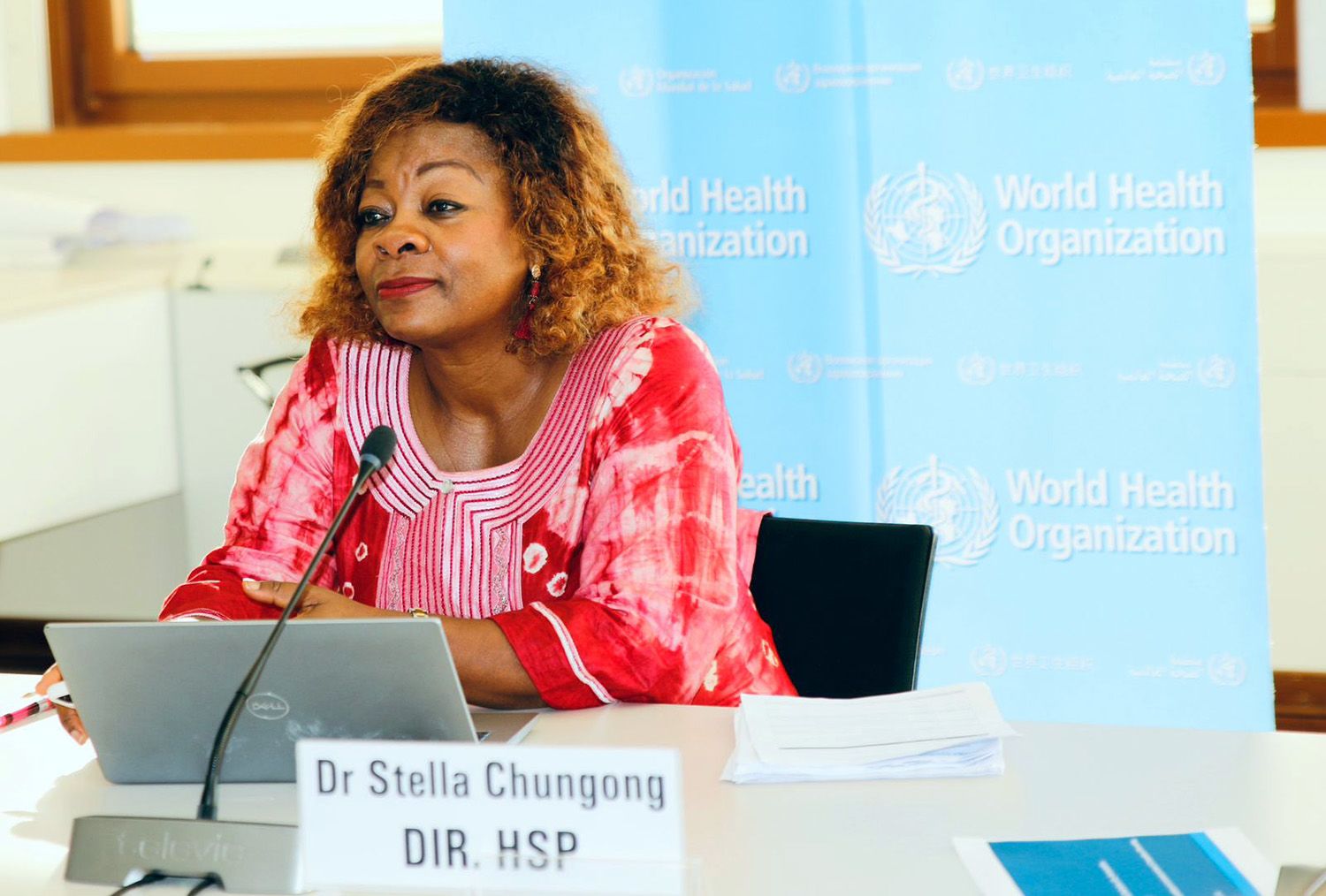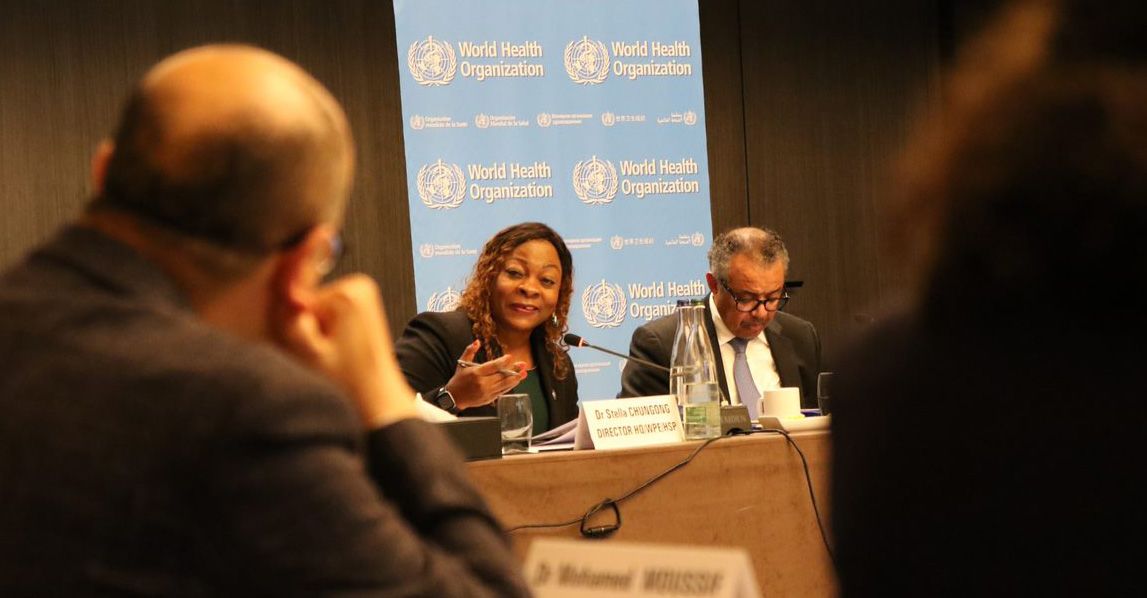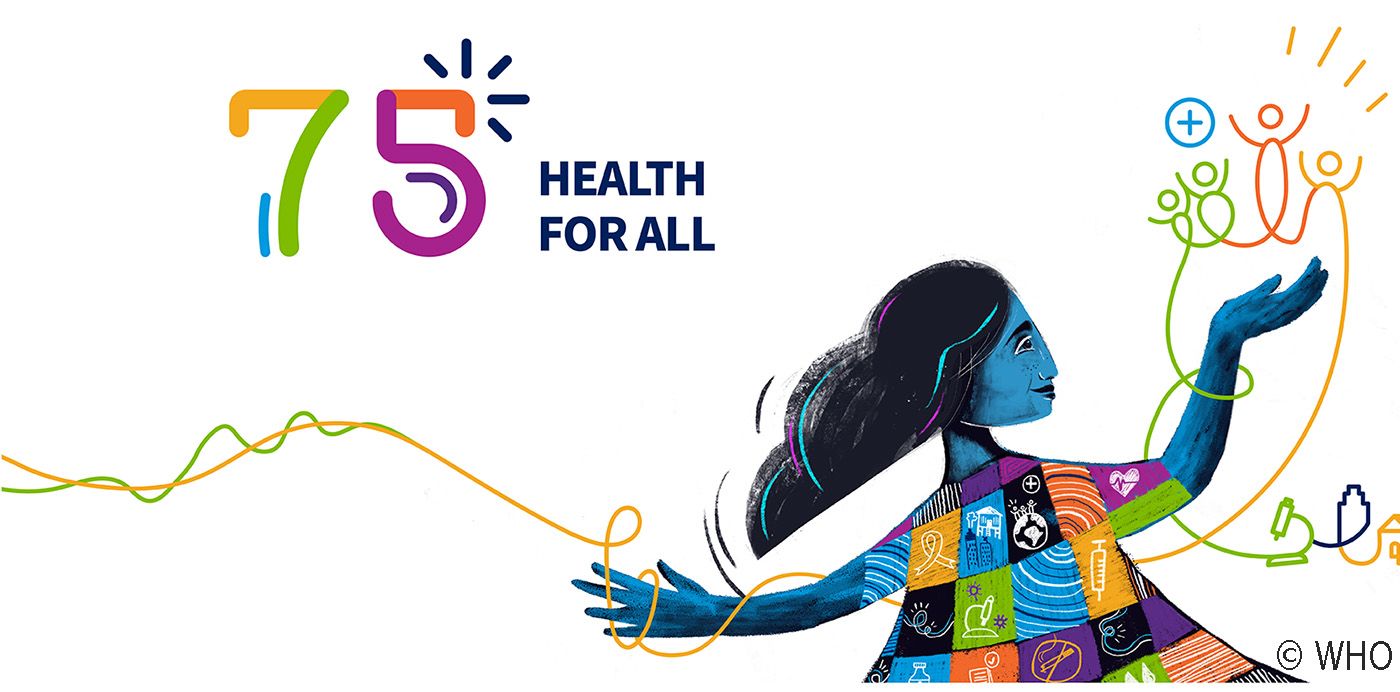Leeds at the WHO: Stella Chungong
Leeds graduate Stella Chungong is Director of the Health Security Department, Emergency Programme, at the World Health Organization (WHO).

Dr Stella Chungong is Director of the Health Security Department, Emergency Programme.
Dr Stella Chungong is Director of the Health Security Department, Emergency Programme.
Dr Stella Chungong graduated with a Masters in Public Health in 1995. She discusses the WHO's role in preparing for health emergencies – and lessons learned from Covid-19.
How does your department deal with health security?
The Health Security Department responds to the evolving global health security landscape.
We work with partners and the broader global heath security community to ensure that the most vulnerable communities, in all countries, are better protected from the impact of health emergencies.
Our work involves promoting global public health security at all levels, from nations to communities. We’re constantly engaging the highest levels of governments and the global community.
We need to maintain the centrality of science to the WHO’s work and protect the legitimacy of science and scientific institutions.
We support the WHO's 194 member states in building sustainable preparedness to help them detect and respond to all-hazards risks and emergencies. This includes strengthening multisectoral approaches for health security.
We work with them to scale up their implementation of the International Health Regulations (IHR), an agreement that protects the public worldwide against the spread of international disease.
Research, development and innovation are important tools for our work in health security. Our evidence-based approach is key to preparing for future epidemics and pandemics. We implement IHR monitoring and evaluation tools to build the evidence for health security preparedness capacity.

Preparing for health emergencies involves a large variety of experts and approaches.
Preparing for health emergencies involves a large variety of experts and approaches.
What changes in healthcare do you foresee?
Overall, the pandemic led to significant disruptions and challenges, but it also highlighted areas where we can improve and make meaningful changes.
Everyone witnessed the value of scientific research and technological innovation in addressing global health challenges, and this should lead to increased investment in these areas. We need to maintain the centrality of science to the WHO’s work and protect the legitimacy of science and scientific institutions.
With marginalized communities disproportionately affected by Covid-19, there’s now a greater focus on addressing health disparities and promoting health equity, including gender-responsive management of health emergencies. This links to a need to address social determinants of health, such as income, race and education.
Communities must be at the centre of this work and they need to be informed and engaged from the start.
The pandemic demonstrated that preparedness should be seen as an investment, not a cost.
We saw the tangible price of a lack of investment in public health preparedness in lost lives and massive economic disruption. If lessons have been learned, we’ll develop improved early warning systems, vaccine research and public health messaging.
The shift towards remote work and telemedicine could lead to significant changes in the way we approach work and healthcare delivery, while mental health services are fortunately drawing more attention due to the pandemic’s toll on mental health.
What did we learn about health security from the pandemic?
The Covid-19 pandemic exposed the world's lack of preparedness, and has significantly impacted the field of health security.
We witnessed the importance of coordinated action on health threats that cross national borders. This led to a greater recognition of global health diplomacy and the need for stronger collaboration between countries and international organizations.
The pandemic demonstrated that preparedness should be seen as an investment, not a cost.
The lessons learned from the pandemic include striving for a more resilient and equitable society. Within this context, the WHO's Global Architecture for Health Emergency Preparedness, Response and Resilience was developed to provide stronger and more inclusive management of health emergencies.
Learning from the pandemic, my department has created new guidance on priorities such as Intra-Action Reviews, sustainable preparedness, development of a framework on health systems for health security, urban preparedness and WHO benchmarks for IHR capacities, to name a few.
How is the WHO preparing for future pandemics?
The WHO plays an important role in global health emergencies. It’s a key player in coordinating international efforts and promoting public health policies that protect and promote health for all.

Dr Stella Chungong speaking at meeting, beside the WHO's Director-General Dr Tedros Adhanom Ghebreyesus
Dr Stella Chungong speaking at meeting, beside the WHO's Director-General Dr Tedros Adhanom Ghebreyesus
However, the pandemic has exposed the need for the WHO to have more resources, stronger partnerships with member states and a greater capacity to address emerging and re-emerging health threats.
We’re taking into account the lessons learned from Covid-19, as well as numerous other global health, humanitarian and security crises.
Current high-level initiatives will have a profound impact on global health. WHO member states are in the process of drafting and negotiating a legally binding instrument to strengthen pandemic prevention, preparedness and response.
The WHO's Working Group on the IHR is conducting a review of amendments to these regulations, which are legally binding for all 196 state parties to the regulation. We’re also implementing the Global Architecture for Health Emergency Preparedness, Response and Resilience.
Financially, a new pandemic fund has been launched in collaboration with the World Bank, which will provide catalytic funding for countries to address gaps in preparedness, based on their proposals.

The WHO is celebrating its 75th anniversary – what’s ahead?
The WHO's 75th anniversary is a significant milestone highlighting the organization's role in promoting global health and its achievements over the past seven decades.
Public health achievements are well known: eradication of Smallpox, elimination or near-elimination of five tropical diseases, making childhood immunization close-to-universal, reducing the number of annual Polio cases by 99 per cent, leading the way on the first-ever Malaria vaccine, developing new approaches to Tuberculosis control, ensuring access to safe water to countless more people and much more.
The WHO continues to stand for equitable access to affordable, quality healthcare and we’ll strive for universal health coverage with strong primary healthcare and human resources at its base for everyone.
We must consider a confluence of crises that roll back the progress and compete for international attention.
But formidable challenges remain. For WHO to protect new generations from health threats and deliver health for all in the 21st century, we must consider a confluence of crises that roll back the progress and compete for international attention.
There are armed conflicts and insecurity. There’s the spread of infectious diseases and pathogens and a global pandemic of non-communicable diseases, particularly affecting lower-income countries. There’s also the spread of antimicrobial resistance and drug-resistant pathogens and, of course, climate change.
Meanwhile, we have misinformation, disinformation and a loss of trust in institutions. Profit-driven industries, including tobacco and alcohol, are among the most significant risk factors for disease, injury and poor health. We have persistent health inequalities – the key barrier on a pathway to health for all and to meeting the UN’s Sustainable Development Goals.
The WHO needs to secure sufficient and predictable funding that matches the value it brings to the world and the complexity of its mandate.
The convergence of Covid-19 and other health emergencies, humanitarian and climate crises, economic constraints, and conflicts make the journey toward health for all more pressing than ever.
We must come together as a global community, recognizing that we are only as strong as the weakest link. All our interventions must be underpinned by the key principles of solidarity, equity and coherence in our actions.
Stella's link to Leeds

What’s your current link with the University of Leeds?
One of the guiding principles of the WHO's work is the importance of science and evidence-based approaches. Strong academic partnerships have significantly supported member states with their preparedness capacities.
I thank the University of Leeds for its longstanding collaboration with the WHO, particularly in health security preparedness.
Leeds has provided significant support in developing and implementing the Health Systems for Health Security framework and in creating the WHO's Framework for Research, Development and Innovation for Health Security Preparedness. I look forward to expanding this partnership with my alma mater.
A remarkable number of alumni have taken their Leeds learning to the top of global institutions – what is it about the University that has led to their success?
A number of key things came through for me. First, the University of Leeds is known for its academic excellence, with a reputation for high-quality teaching and research across a range of disciplines. This academic rigour prepares graduates well for their careers and gives them the knowledge and skills needed to succeed in their chosen fields.
Secondly, Leeds has a diverse student body, with students from more than 170 different countries. This diverse environment fosters cross-cultural understanding and collaboration and helps students develop a global perspective that is highly valued by employers.
Thirdly, Leeds has an international outlook and a strong focus on internationalization. It has partnerships and collaborations with institutions and organizations around the world. This global perspective gives graduates an edge in the global job market and helps them develop a global mindset.
Finally, Leeds has a strong focus on innovation and entrepreneurship, with programmes and initiatives to support start-ups and entrepreneurship. This focus on innovation and creativity encourages graduates to think outside the box and pursue new ideas and ventures.
What message do you have for Leeds alumni who work in health and social care?
I am proud of Leeds alumni working in medicine, healthcare and social care and who are contributing to global health.
As healthcare professionals, it is important to stay up-to-date with the latest developments and actively participate in efforts to strengthen capacities in these fields.
Always strive to learn – about global policies, national strategies, community practices or individual actions. Learn from your experiences, learn from the experiences of others. Be advocates for what you believe in. Help reduce disparities, ensure equitable access to health and health care and make health for all a reality.
You do make a difference to the lives of populations, communities, families and children. Every little bit counts.
How did your time at Leeds shape your career?
When I left Switzerland for Leeds some 28 years ago, I was not sure what to expect. I told myself if I didn’t like it, I could always go back to clinical medicine. But I fell in love with public health in Leeds and I’ve never looked back.
I was allowed to draw freely on experiences I never knew were relevant. I was encouraged to think out of the box, solve problems and find solutions. I was urged to be proactive and assertive, yet learn with humility; to be confident, yet always seek to know more.
I was encouraged to care about people and how global policies could affect the health and wellbeing of the most defenseless, even in the most remote areas of the world, to influence, even in the smallest way, policies that could affect the lives of the most vulnerable. I was inspired by this University to want more, to do more and to be more.
Do you have an abiding memory of your time at Leeds, other than your academic work?
Yes! I remember the friendships made in Leeds, some of which I still cherish today. I remember how much I learned about other cultures and perspectives due to the international nature of my programme. I remember going to watch movies in Bradford, and of course, I remember our student parties.
I also remember meeting kind families, like that of Dr John Walley, who helped make me feel less homesick. Thank you, John, and all the other lecturers who made us feel so welcome. ems.
Forever Leeds
312,000 alumni
197 countries
One global community
Never miss a moment
Update your details
Follow @LeedsAlumni
